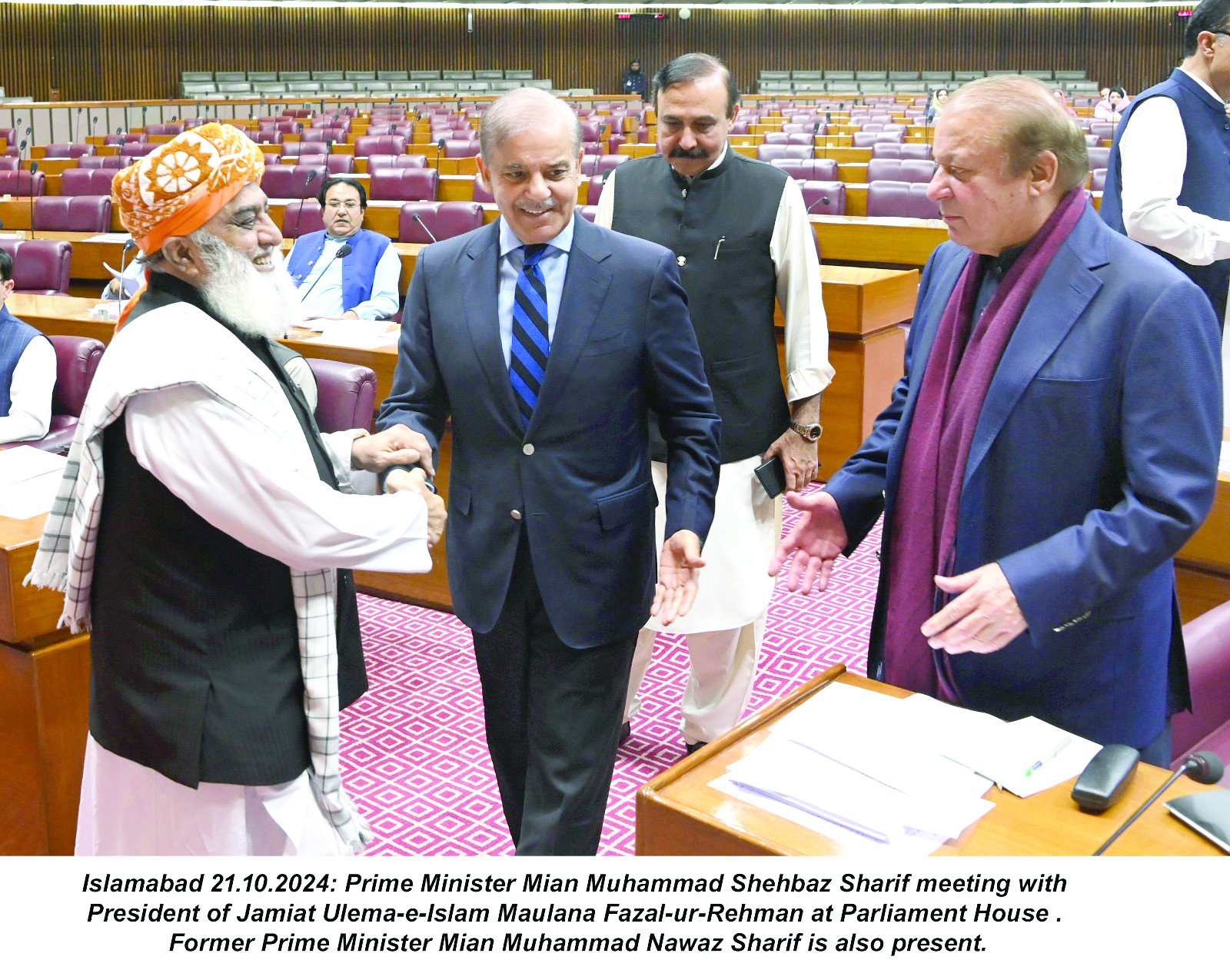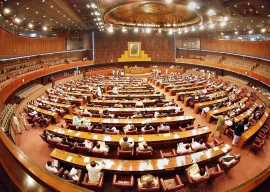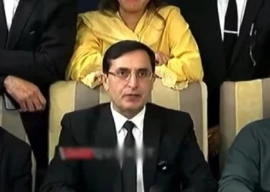
At last, the "lion" roared and the "arrow" hit the target in parliament, the "book" provided the base, yet the "bat" could only managed to swing in the air. However, amid all this, the "black coats" rang the alarm bells.
The 26th Constitutional Amendment Bill sailed through Senate on Sunday and later in National Assembly in the wee hours of Monday, after the Pakistan Muslim League-Nawaz (PML-N)-led ruling coalition finally showed two-thirds majority in both house of parliament with some dissident votes.
In the Senate, where the bill was passed first, the coalition completed the number with the support of five senators of the Jamiat Ulema-e-Islam-Fazl (JUI-F) and two of the Balochistan National Party-Mengal (BNM). The Pakistan Tehreek-e-Insaf's (PTI) opposition denied the coalition of unanimous approval.
In the same way, the government surpassed the 224 -- minimum two-thirds requirement – in the National Assembly with the support of eight lawmakers from the JUI-F, plus four 'independent' members who belonged to Pakistan Tehreek-e-Insaf (PTI), also supported the bill.
In the National Assembly, when the bill was put up for voting, 225 members – one more than the two-thirds -- voted for the bill with just 12 opposing it. It was same as the Senate where the coalition got 65 votes -- one more than the two-thirds majority of 64.
This culminated the effort that was initiated last month. It came after the treasury benches managed to persuade JUI-F chief Maulana Fazlur Rehman to direct his party lawmakers in both house to give their five votes in Senate and eight in the National Assembly in favour of the amendments.
In September, the Maulana had thwarted the move at the last minute, which led to another round of negotiations among the political parties, which continued till Sunday. And immediately afterwards the bill was passed by the cabinet and put before parliament.
Soon after the Senate passed the bill, the National Assembly convened its session to give its stamp of approval to the 26th Amendment. The process, however, started from Sunday and entered into Monday.
The speeches of key leaders in Senate and the National Assembly contributed to the delay but, given the importance of the bill coupled with their grievances against the role of the judges and judiciary in the past, everyone stayed put as the clock even struck 3am.
Former prime minister Nawaz Sharif spoke for the first time in the assembly since he has been elected as a member (MNA) but confined himself to only say a couplet, conveying the pain that caused by judiciary's several decisions, which were such that one could neither live nor die.
JUI-F chief Maulana Fazlur Rehman said that constitutional amendment shouldn't be person-specific rather "it's aim should be such that neither the government nor the opposition should have any fears or doubts" about the top judge of the country.
Pakistan Peoples Party (PPP) Chairman Bilawal Bhutto Zardari said that the amendment was crucial because the judges in the country had grown accustomed to interfering in matters of politics, foreign policy, and the economy, when it wasn't their job.
"The establishment of constitutional benches will devolve power" and offer immediate relief to the public, he said. "Politics is not about stubbornness, hence the PPP, agreeing to the demands of the opposition including the JUI and PTI, compromised and settled on a constitutional bench."
He argued that many raised the question that establishing a constitutional bench or court would be tantamount to setting up of a court above the court but no one said so when the Senate was made above the National Assembly.
The reason, he said, the Senate strengthened the federation, adding that the constitutional benches will do the same through judiciary. Bilawal succinctly captured this compromise by quoting Shakespeare: "A rose by any other name is still a rose."
Defence Minister Khawaja Asif said that the move was aimed at empowering parliament and taking back its powers snatched by judiciary. "If civilian government can pick army chief", Asif said, then "what's wrong with choosing a chief justice by a commission comprising civilians. He added that the amendment empowered parliament and the concept of vote ko izzat do [respect the vote].
The government side openly credited PPP Chairman Bilawal for presenting the idea of completing the unfulfilled agenda that his mother Benazir Bhutto, and PML-N President Nawaz Sharif had signed in the shape of Charter of Democracy in 2006.
Opposition Leader in the National Assembly Omar Ayub Khan opposed the bill, saying the move had weakened the judiciary. He equated the bill with someone's desire to kill an animal for the sake of just a handful of meat.
PTI Chairman Barrister Gohar Khan said that the treasury lashed out at judiciary even more than they criticised India or anyone else. He also raised questions about the legislation without the allocation of the reserved seats in the national and other assemblies.
Through the bill, significant changes have not only been made in the criteria for selecting the chief justice of Pakistan (CJP) but separate constitutional benches have been constituted in the Supreme Court and the high courts to limit the judicial activism.
"The term of the Chief Justice of Pakistan shall be three years or unless he sooner resigns or attains the age of 65 years or is removed from his office in accordance with the Constitution," reads the 26th Constitutional Amendment Bill.
The bill further states that a 13-member judicial commission, comprising the chief justice, the presiding officer, three most senior judges of Supreme Court, law minister, attorney general for Pakistan, a nominee from the Pakistan Bar Council, two members each from National Assembly and the Senate, and a woman or non-Muslim from outside parliament will work for the appointment of the judge in the Supreme Court, high court and federal Shariat Court. The commission will also evaluate high court judges' performance.
Through an amendment in Article 191-A, the bill said, there shall be constitutional benches of the Supreme Court, which may comprise equal number of judges from each province. It adds that the most senior judge shall be the presiding judge of the constitutional benches.
These benches will hear original, appellate and advisory jurisdiction of the top court, adding the bench shall not be less than five judges. Under Article 202A, constitutional benches will be established in high courts and they will hear only constitutional matters.
The bill also states that under Article 175A that there shall be a Special Parliamentary Committee, which will nominate the chief justice of Pakistan from amongst the three most senior judges of the top court. The special committee will send the name of the nominee to the prime minister who will forward that name to the president for appointment.
Provided, it adds, if the nominee declines then the remaining judges from amongst the three most senior judges shall be considered and nominated. It further says that if the nominee also declines then the next most senior judges if he is not from amongst the three most senior judges shall be considered and nominated by the committee and so on till the nominee is appointed as the chief justice.
An amendment to Article 184, not only ended suo motu powers of Supreme Court but barred it from exercising jurisdiction beyond the contents of any application. The Article 186A empowers the top court to transfer any case, appeal or proceedings pending before high court to other high court or to itself.
Amendment to Article 177 says that a person shall not be appointed as judge of the Supreme Court unless he is a citizen of Pakistan. Amendment to Article 193 says that a person shall not be appointed as a judge of a high court unless he is a citizen of Pakistan and is not less than 40 years of age.
The JUI-F tabled an amendment to Article 38, which was related to Riba [usury], stating that Riba should be ended by January 1, 2028. A new Article 9A ensured that clean and healthy environment was a fundamental right of every person in Pakistan.
Renowned lawyer Hamid Khan while talking to media at Parliament said that lawyers' movement will be started against the 26th Amendment.


1729496452-0/diddy-(32)1729496452-0-165x106.webp)















COMMENTS
Comments are moderated and generally will be posted if they are on-topic and not abusive.
For more information, please see our Comments FAQ